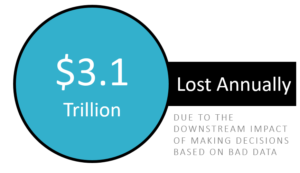We often think about the importance of good quality data to drive patient outcomes when we talk about improving care and reducing healthcare costs. We use data to design clinical decision support, to influence how we manage patient populations, and to evaluate trends to evolve how care is delivered, all to ensure we provide the best possible care to a patient.
Getting good quality data takes time and effort. The cost of poor data is extraordinarily expensive according to Thomas C. Redman’s article in Harvard Business Review. In the US alone, poor data costs $3.1 trillion annually, according to an IBM estimate. The major cause is the downstream impacts of decisions and actions made on bad data.

Redman explains the cost stems from end-users correcting for the inaccuracies in data themselves just to complete their work more quickly. The downstream effects of this for your health system are pervasive. When end-users don’t report the quality issues with data, your data architects don’t get the feedback to know there is a problem to correct, and the bad data continues to live on. Every time a clinician turns to this data, they’re spending a little bit of time correcting it to move forward. And that’s the best-case scenario. If the error isn’t caught, clinical decisions are made based on poor quality data, and the downstream cost can balloon quickly with unnecessary tests and declining patient condition.
The solution to data inefficiencies is data governance. Effective data governance lowers your risk of big costs and poor patient outcomes by establishing communication channels between users and data architects, a standard for the identification and approval of a data need, and establishing a source of truth for future consumption.
As Redman points out, it takes some work for data consumers to understand and articulate what they need, and even then, your report and clinical decision analysts may misunderstand the need. It’s therefore important to establish a line of communication between those who need the data and those who create it. Data governance creates that line.
At Prominence, we’re ready to partner with you to develop your data governance strategy from the ground up, or take it to the next level. Find out more about our strategies for effective data governance here.